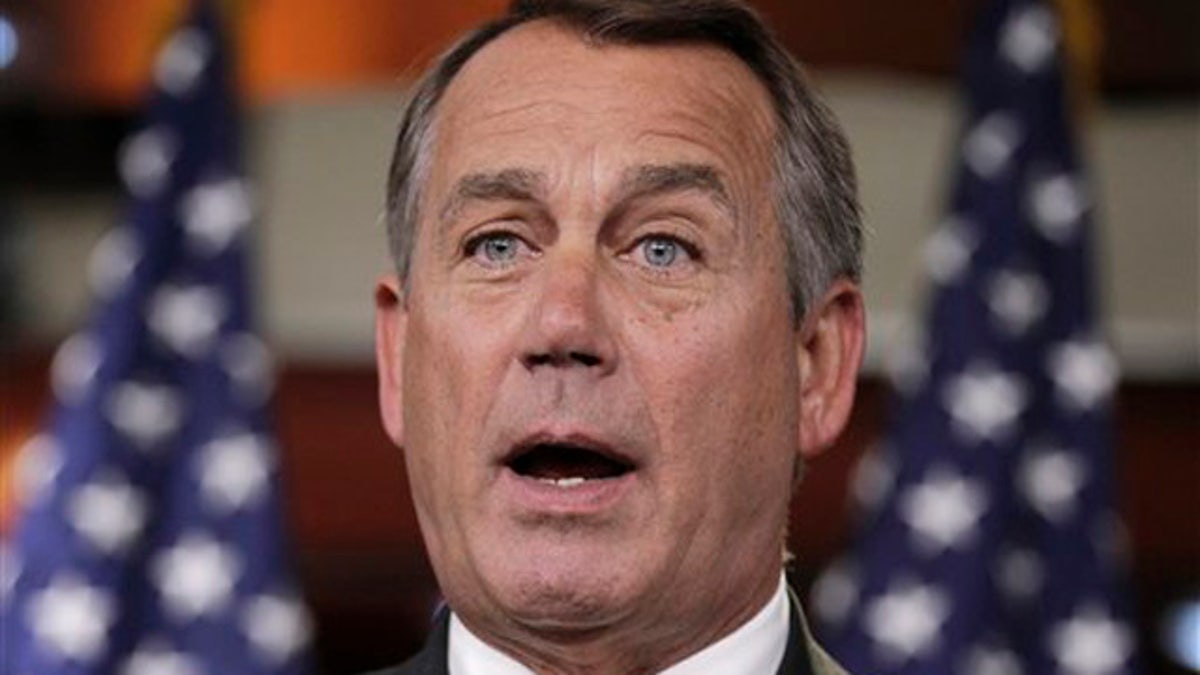
Dec. 2, 2011: House Speaker John Boehner meets with reporters on Capitol Hill in Washington. (AP)
WASHINGTON – House Republicans are on a collision course with the White House and potentially the Senate over an emerging proposal to extend the payroll tax cut, teeing up a protracted debate that could keep lawmakers in Washington for the holidays as they try to avert a Jan. 1 tax increase.
The Senate on Thursday afternoon rejected rival Democratic and GOP plans for extending the cut. The failure was expected, cueing the House to step in with a new plan.
Details of that proposal, expected to be unveiled in full on Friday, suggest its Republican authors are preparing for a showdown with President Obama. The bill includes a controversial provision to move along the construction of an oil pipeline from Canada to Texas -- the Obama administration recently put that project on hold until after the 2012 election, citing environmental and safety concerns.
The provision pertaining to the Keystone pipeline helped sweeten the deal for House conservatives skeptical of a payroll tax extension.
Rep. Lee Terry, R-Neb., told Fox News that a number of Republicans who were on the fence said they would vote for the bill if it includes the Keystone pipeline provision.
House Speaker John Boehner said Thursday he's confident Republicans are ready to move on the proposal.
But Obama explicitly has said he will reject any effort to tie the Keystone pipeline construction to the tax extension. His allies echoed that message Friday.
"It's a non-starter," House Democratic Leader Nancy Pelosi said.
Her top deputy, Rep. Steny Hoyer, D-Md., urged Republicans to "reconsider" the Keystone language.
White House Press Secretary Jay Carney warned Republicans not to include "extraneous attachments" in the bill.
"Whatever happened to Republicans being for tax cuts?" Carney asked. "Is it because this one goes to 160 million Americans, middle-class working Americans, that they're ambivalent or they're willing to oppose it if they don't get some political scalp? Is it because President Obama supports it, or Democrats support it?"
At stake is a cut in the Social Security tax valued at about $1,000 a year for the average family.
The rate was lowered from 6.2 percent to 4.2 percent for 2011, but that expires at the end of the year without action by Congress. Obama has called for extending the cut, and increasing it by another percentage point. He also wants Congress to extend unemployment insurance.
But while Congress appeared to be heading once again toward gridlock, the House could be in a position to try to corner the Senate.
House leaders could be poised to hold a vote on the bill, as early as next week, and then send their members home for the holidays -- in turn forcing the Senate to decide between their bill and no bill. This would then force a confrontation between the Senate and the White House.
Terry said he thinks there's a "high" likelihood the House will try to stick the Senate with their version of the bill.
"Frankly, the fact that the president doesn't like it makes me like it even more," said Ohio Rep. Jim Jordan, a leader of House conservatives, who added he had supported an earlier version, as well.
According to sources, the House bill's price tag clocks in at between $175 billion and $180 billion.
At its core, the emerging House bill would extend the existing Social Security payroll tax cut at the heart of Obama's jobs program, through 2012. It also would renew an expiring benefit program for the long-term unemployed the president also favors, although at a reduced level from current law.
In addition, Republicans are proposing to avert a 27 percent cut in payments to doctors serving Medicare patients, a provision that Democrats have said privately they are receptive to.
The emerging House bill also is expected to block implementation of a proposed Environmental Protection Agency regulation limiting toxic emissions from industrial incinerators, another potential area for dispute with the White House.
While there is general agreement among leaders of both parties that the legislation must be paid for to avoid raising deficits, there are differences over the details.
Democrats favor imposing a surtax on incomes over $1 million, hoping to depict Republicans -- nearly all of whom are opposed -- as protecting millionaires at the expense of the middle class.
House Republicans want to raise premium fees on the wealthy for Part B Medicare, a change that they note would fall on many of the same people the Democrats want to tax.
The House bill also would freeze pay for two additional years for federal retirees and increase their retirement costs.
Also in the measure is the repeal of nearly $43 billion already approved for the year-old health care law, which stands as Obama's signature domestic achievement.
There was no suspense in the Senate on Thursday, where blocking maneuvers left rival payroll tax plans short of the 60 votes needed to advance for the second consecutive week.
The vote on the Democrats' plan was 50-48, with Sen. Susan Collins of Maine the only Republican in favor. It would lower next year's payroll tax to 3.1 percent, financed mainly by the millionaire surtax.
The Republican measure was turned aside 22-76. A majority of Republicans opposed it, reflecting the party's internal divisions. That measure would leave next year's payroll tax at 4.2 percent, paid for largely by freezing salaries and cutting the size of the federal workforce.
The Associated Press contributed to this report.




